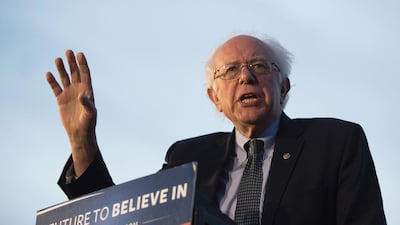Even-handedness is important when approaching the Middle East, I tell my students. But in American politics it has long been a risky business. True even-handedness requires recognising that no human life is worth less, or deserving of less, than any other. No individual’s rights to life, liberty, property and dignity can be diminished on the basis of the national category into which they’re placed.
The indivisibility of human rights should be common sense, but it’s largely absent in United States policy on the Israeli-Palestinian conflict – often on the assumption that Jewish sensibilities are honoured by ignoring or demeaning Palestinian rights. But for many Jews, the ethical essence of Judaism was expressed by the venerated sage Hillel, who when challenged to define his religion while standing on one foot, answered: “That which is hateful unto yourself, do not do unto others.”
Democratic Party presidential candidate Bernie Sanders cited Hillel's ethical injunction in explaining to The Washington Post what being Jewish meant to him, adding that it created the moral imperative that requires him to help those who suffer.
Mr Sanders may not win the Democratic presidential nomination, but his campaign has already succeeded in mustering a grassroots challenge to that party’s corporate-friendly establishment. Mr Sanders has advocated a return to the party’s New Deal social-democratic roots. He wants intervention in the economy to help the poor and restrain the greed of the 1 per cent of the population that owns more of America’s wealth than the bottom 90 per cent. And it’s those ideas, rather than his personality, that have fuelled a remarkably robust challenge to Barack Obama’s heir-apparent, Hillary Clinton.
Nor has he confined his battle of ideas to economic inequality. He has castigated Mrs Clinton for supporting the disastrous invasion of Iraq, and even derided the antidemocratic Cold War interventionism of her mentor, Henry Kissinger. And he shattered a long-standing political taboo by castigating Israel’s treatment of the Palestinians.
Challenged to defend his branding of Israel’s 2014 pummeling of Gaza as “disproportionate”, Mr Sanders not only stood his ground, he went on the offensive. He demanded that Israel and the US “treat Palestinian people with respect and dignity” and insisted that Washington “cannot continue to be one-sided”.
In remarks considered shocking in a political culture where Palestinians are usually spoken of only as a problem for Israel, Mr Sanders blasted his opponent’s refusal to discuss Palestinian rights.
In a CNN debate, Mr Sanders referenced Mrs Clinton’s speech before the American Israel Public Affairs Committee. “I heard virtually no discussion at all about the needs of the Palestinian people. Of course Israel has a right to defend itself, but long-term there will never be peace in that region, unless the United States plays an even-handed role, trying to bring people together and recognising the serious problems that exist among the Palestinian people.”
CNN’s deadpan reporting on the event is telling. “Sanders’s nationally televised stance could represent a watershed moment in Democratic politics, as the sole Jewish candidate in the race – and the only one to have lived in Israel – smashed a taboo that could lead others to follow suit,” the network noted, suggesting that support in the party was waning for the unconditional backing of Israel.
As CNN pundit and Sanders supporter Van Jones noted, a US presidential candidate calling for a balanced approach to the Israeli-Palestinian conflict “takes a level of courage and a level of integrity”.
Republican front-runner Donald Trump got into trouble a few months ago when he suggested that the US would only be able to make peace in the Middle East if it presented itself as more neutral – although he has since sought to curry favour with the pro-Israel establishment.
The idea that demanding that the US be an honest broker and recognise Palestinian human rights is seen as dramatic is a reflection of how distorted its Middle East policy has become.
Mr Sanders’s comments actually iterate an approach to the Palestinians expressed in Mr Obama’s 2009 speech in Cairo. “For more than 60 years they have endured the pain of dislocation,” he said. “Many wait in refugee camps in the West Bank, Gaza and neighbouring lands for a life of peace and security that they have never been able to lead. They endure the daily humiliations – large and small – that come with occupation. So let there be no doubt: the situation for the Palestinian people is intolerable. America will not turn our backs on the legitimate Palestinian aspiration for dignity, opportunity, and a state of their own.”
Mr Obama’s speech was all the more remarkable for noting that the Palestinian trauma was a result of “the displacement brought by Israel's founding”. Despite those words, Mr Obama did very little to honour his promise. Now Mr Sanders is insisting that the US has to stand not only for Israeli security, but also for Palestinian rights – and drawing massive support. The symbolic significance of an elderly Jewish leftie, who none dare call an anti-Semite, shaming the Democratic Party establishment for abandoning the Palestinians is huge. The shifts under way in American politics suggest that it may even mark a watershed, regardless of the outcome of his campaign.
Tony Karon teaches in the graduate programme at the New School in New York

